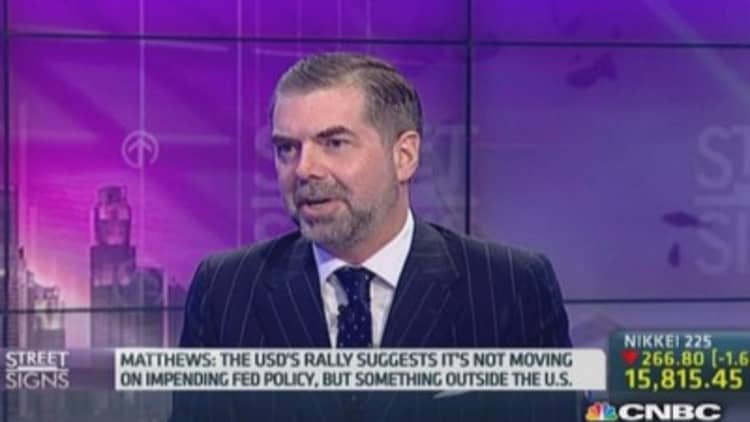The rally has much further to run, and could help out countries dealing with excessively low inflation, a report from HSBC argues.
The dollar index, which measures the strength of the greenback against the major currencies, has risen near 7 percent this year, amid positive economic data out of the U.S. and increased expectations that as the U.S. Federal Reserve ends its massive bond-buying program, it will hike interest rates.
Read MoreWhy the dollar-yen rally will fizzle soon
But the rally has only just begun, analysts at HSBC said in a note published this week, who argue the greenback should rein supreme as the world's strongest currency both this year and next.
"The current U.S. dollar rally is unlike any we have seen before...[the rally] so far has only been roughly 5 percent yet history shows a 20 percent rise would not be implausible," the analysts said.
And the dollar's relative strength could be the perfect antidote for other global economies, such as the euro zone, struggling to fend off the threat of deflation, said HSBC. The single currency union this week saw its annual inflation rate fall further below the European Central Bank's target of 2 percent in September to 0.3 percent.

The idea is that if U.S. goods start to look too expensive due to the stronger dollar, buyers of those goods will start to look at alternatives nearer home, therefore increasing demand and consequently leading to a rise in prices.
"While the scale of a U.S. dollar rally required to bring inflation all the way back to target in the likes of the euro zone would likely be unpalatable to U.S. policymakers, U.S. dollar strength will still help stave off the deflation threat," added the HSBC analysts.
"The U.S. dollar on its own may not be able to save the world but it will certainly buy these economies time," they added.
Read MoreWhy a strong dollar is scarier than taper tantrum
Currency wars intensify
The greenback's strength has not only been influenced by domestic factors however, HSBC analysts point out -- it has also been a product of the changing nature of "currency wars" between the global economies. Normally, a currency war is where one government deliberatley devalues its currency to gain a competitive edge over other countries.
Japan's currency has weakened over 25 percent against the dollar since early 2013 as policy makers embarked on an ambitious reform plan designed to turnaround the Japanese economy, for example.
But the HSBC analysts say the nature of these "currency wars" has changed, arguing that other global economies are keeping their currencies weak to stave of deflation - rather than stimulate growth through exports.
"Reviving exports is a secondary objective at best. This is a currency war where stealing inflation rather than growth is the goal," the analysts said, adding that this is another factor why the dollar's rally is set to continue.


